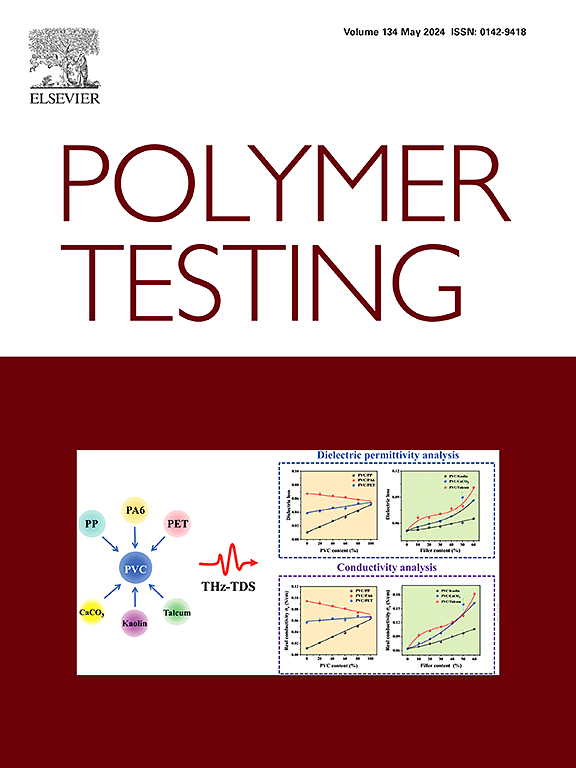利用原位核磁共振光谱深入了解非异氰酸酯聚氨酯 (NIPU) 的聚合动力学
IF 5
2区 材料科学
Q1 MATERIALS SCIENCE, CHARACTERIZATION & TESTING
引用次数: 0
摘要
我们开发了一种利用液体核磁共振 (NMR) 光谱进行原位表征的方法,以帮助从环状碳酸酯氨解中制备高活性非异氰酸酯聚氨酯 (NIPU)。利用这种方法,我们充分研究了 5 元双环碳酸酯 (5CC) 与 1,4-二氨基丁烷反应生成的模型 NIPU 的氨解动力学和最终聚合物结构,以及氨解催化剂的类型和浓度以及反应温度对其的影响。对已报道的几种 NIPUs 合成催化剂进行了比较,包括 1,5,7-三氮杂双环[4.4.0]癸-5-烯 (TBD) 和 1,8-二氮杂双环[5.4.0]十一-7-烯 (DBU)。此外,还研究了 5CC 水解副反应的动力学。TBD 的活化能为 29.7 kJ mol-1,显然是最有效的催化剂,在 0.35 eq5CC 的浓度下,5CC 转化率可达 100%。不过,在这些实验条件下,TBD 的浓度对水解率也有不可忽视的影响,在 353 K 的条件下,TBD 的浓度占初始 5CC 浓度的 6% 到 14%。催化剂和温度似乎都不会影响聚合物结构,含仲羟基的异构体比例为 (70 ± 6)%。最后,这种原位核磁共振方法为快速筛选可持续合成 NIPU 的创新催化剂铺平了道路。本文章由计算机程序翻译,如有差异,请以英文原文为准。
Insights on the polymerization kinetics of non-isocyanate polyurethanes (NIPU) using in situ NMR spectroscopy
An in situ characterization method using liquid Nuclear Magnetic Resonance (NMR) spectroscopy has been developed to aid the preparation of highly reactive non-isocyanate polyurethanes (NIPUs) from cyclic carbonate aminolysis. Using this methodology, the aminolysis kinetics and the final polymer structure of a model NIPU obtained by reaction of a 5-membered bis-cyclic carbonate (5CC) and 1,4-diaminobutane have been fully investigated, as a function of the type and concentration of the aminolysis catalyst, and the reaction temperature. Several catalysts already reported in NIPUs syntheses, including 1,5,7-triazabicyclo[4.4.0]dec-5-ene (TBD) and 1,8-diazabicyclo[5.4.0]undec-7-ene (DBU), have been compared. The kinetics of the 5CC hydrolysis side reaction was also studied. With an activation energy of 29.7 kJ mol−1, TBD was clearly the most efficient catalyst used, allowing 5CC conversion ratio of up to 100 % using a concentration of 0.35 eq5CC. However, under these experiment conditions, TBD concentration also showed to have a non-negligible influence on the hydrolysis rate, representing between 6 and 14 % of the initial 5CC concentrations, at 353 K. Neither the catalyst or the temperature seemed to affect the polymer structure, with secondary hydroxyl-containing isomer proportions of (70 ± 6) %. Finally, this in situ NMR method is paving the way for rapid screening of innovative catalysts for sustainable NIPU synthesis.
求助全文
通过发布文献求助,成功后即可免费获取论文全文。
去求助
来源期刊

Polymer Testing
工程技术-材料科学:表征与测试
CiteScore
10.70
自引率
5.90%
发文量
328
审稿时长
44 days
期刊介绍:
Polymer Testing focuses on the testing, analysis and characterization of polymer materials, including both synthetic and natural or biobased polymers. Novel testing methods and the testing of novel polymeric materials in bulk, solution and dispersion is covered. In addition, we welcome the submission of the testing of polymeric materials for a wide range of applications and industrial products as well as nanoscale characterization.
The scope includes but is not limited to the following main topics:
Novel testing methods and Chemical analysis
• mechanical, thermal, electrical, chemical, imaging, spectroscopy, scattering and rheology
Physical properties and behaviour of novel polymer systems
• nanoscale properties, morphology, transport properties
Degradation and recycling of polymeric materials when combined with novel testing or characterization methods
• degradation, biodegradation, ageing and fire retardancy
Modelling and Simulation work will be only considered when it is linked to new or previously published experimental results.
 求助内容:
求助内容: 应助结果提醒方式:
应助结果提醒方式:


